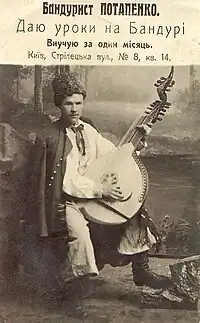bandura
See also: bandură and bandurą
English
WOTD – 24 August 2019
Etymology


A Kharkiv-style bandura
Borrowed from Ukrainian банду́ра (bandúra), possibly through Italian pandura and Polish bandura, from Late Latin pandura (“musical instrument with three strings”), from Ancient Greek πανδοῦρα (pandoûra, “three-stringed lute; zither”), perhaps from Lydian.[1]
Pronunciation
- (Received Pronunciation) IPA(key): /bænˈdʊəɹə/, /bænˈdɔːɹə/
Audio (RP) (file) - (General American) IPA(key): /bænˈduɹə/
- Hyphenation: ban‧du‧ra
Noun
bandura (plural banduras)
- A Ukrainian plucked stringed instrument with a tear-shaped body, like an asymmetrical lute or a vertical zither, which is played with both hands while held upright on the lap.
- 1871, [Nikolai Nikolaevich] Muraviev, “Return”, in Philipp Strahl, W[illiam] S[tephen] A[lexander] Lockhart, transl., Muraviev’s Journey to Khiva through the Turcoman Country, 1819–20. Translated from the Russian […]; and from the German […], Calcutta: Printed at the Foreign Department Press, […], →OCLC, page 81:
- He touches the strings and pours forth a song descriptive of his live, his wanderings, his anguish, and is discovered by the magic tones of the bandura, his adventures, above all, by his voice and passionate fire.
- 1886, Nikolaï Vasilievitch Gogol, chapter III, in Isabel F[lorence] Hapgood, transl., Taras Bulba [...] Translated from the Russian, New York, N.Y.: Thomas Y[oung] Crowell & Co. […], →OCLC, page 75:
- The whole night passed amid shouts, songs, and rejoicings; and the rising moon gazed long at troops of musicians traversing the streets with bandouras, flutes, round balalaikas, and the church choir, who were kept in the Setch to sing in church and glorify the deeds of the Zaporozhtzi.
- 1887, Vladímir Korolénko, “The Forest Soughs. A Forest Legend.”, in Aline Delano, transl., The Vagrant and Other Tales, New York, N.Y.: Thomas Y[oung] Crowell & Co. […], →OCLC, page 50:
- I have an old bandura hanging up on the wall in the hut. Opanás taught me to play on it, but there is no one to play it after me; and when I die, and that may be soon, perhaps nowhere in the wide world will one be found to play the bandura.
- 1913, Bernard Pares, Maurice Baring, Samuel N[orthrup] Harper, editors, The Russian Review: A Quarterly Review of Russian History, Politics, Economics and Literature, volume 2, Paris, New York, N.Y.: Thomas Nelson and Sons, →OCLC, page 177:
- 'Thank you, master, for your lesson. I will sing you a song if you will listen;' and he touched a string of the bandura.
- 1988, Commission on the Ukraine Famine, quoting Oleksander Honcharenko (interviewee), “Appendix I: Translations of Selected Oral Histories [Case History LH38: Translated from Ukrainian by Darian Diachok]”, in Investigation of the Ukrainian Famine 1932–1933: Report to Congress […], Washington, D.C.: United States Government Printing Office, →OCLC, page 337:
- It was only at this time that bandura players emerged from underground. They had been banned from playing under the Tsar, and then they emerged and began to remind everyone openly about their Cossack past and to awaken feelings of nationalism in young children.
- 1997, David [Benedict] Reck, Music of the Whole Earth, New York, N.Y.: Da Capo Press, →ISBN, page 133:
- In the Ukraine of Russia the large bandoura with its almost circular face and as many as thirty strings (combining a zither function with fingered lute technique) is a popular short-necked lute, [...]
- 1999 November, Alexis Kochan, Julian Kytasty, “Ukraine: The Bandura Played On”, in Simon Broughton, Mark Ellingham, and Richard Trillo, with Orla Duane and Vanessa Dowell, editors, World Music: Volume 1: Africa, Europe and the Middle East (The Rough Guide), London: Rough Guides, published October 2000, →ISBN, page 309:
- The bandura, a kind of zither, is unique to Ukraine and is considered the national instrument.
- 2007, John Radzilowski, “Bringing Ukrainian Traditions to North America”, in Robert D. Johnston, editor, Ukrainian Americans (The New Immigrants), New York, N.Y.: Chelsea House, Infobase Publishing, →ISBN, page 91:
- The classical bandura is tuned diatonically and has 20 strings and wooden pegs; the Kharkiv bandura is tuned diatonically or chromatically and has a single string mechanism and 34 to 65 strings; and the Kyiv bandura, which has 55 to 64 strings, is tuned chromatically.
Derived terms
Translations
Ukrainian plucked stringed instrument
|
See also
- Appendix:Glossary of chordophones
References
- Melnychuk, O. S., editor (1982–2012), “бандура”, in Етимологічний словник української мови [Etymological Dictionary of the Ukrainian Language] (in Ukrainian), Kyiv: Naukova Dumka.
Polish
Etymology
Borrowed from Latin pandūra, from Ancient Greek πανδοῦρα (pandoûra). Doublet of banjo and mandola.
Pronunciation
- IPA(key): /banˈdu.ra/
Audio (file) - Rhymes: -ura
- Syllabification: ban‧du‧ra
Declension
Declension of bandura
| singular | plural | |
|---|---|---|
| nominative | bandura | bandury |
| genitive | bandury | bandur |
| dative | bandurze | bandurom |
| accusative | bandurę | bandury |
| instrumental | bandurą | bandurami |
| locative | bandurze | bandurach |
| vocative | banduro | bandury |
This article is issued from Wiktionary. The text is licensed under Creative Commons - Attribution - Sharealike. Additional terms may apply for the media files.